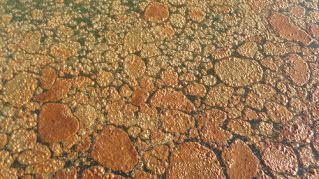Incoming BP CEO: Time for 'scaleback' in cleanup
Just because we can't see it on the shores doesn't mean it isn't there.
You can't pour MILLIONS and MILLIONS of gallons of poisonous crude and MILLIONS and MILLIONS of horribly toxic dispersant into a sea and have it just 'disappear'. BP thinks if it can get the media to start talking about the amazing fact that the oil seems to be gone, we will forget about the disaster? Demand less money from them? Decide nature will clean it all up? Decide it wasn't that big of a mess?
Are you fucking kidding me?
Not in anyone's lifetime today will the Gulf return to what it was before this 'spill'. Gulf sea creatures will have been made extinct. The water has been poisoned. The surviving fish and crustaceans are inedible. People are out of work. Health problems are obvious. Beach real estate prices are plummeting.
A seemingly feel-good story showed up this week on the nation's front pages and newscasts: The oil that befouled the Gulf of Mexico for 86 days is vanishing from the surface, leaving workers with little to clean.But scientists warn the oil's ecological impacts are shifting, not ebbing, thanks to massive volumes of dispersants that have kept the crude beneath the waves."This is a management decision, to use dispersants," College of William and Mary marine science professor Robert Diaz said yesterday. "It doesn't make the oil go away, it just puts it from one part of the ecosystem to another."That dispersed oil now hovers, diluted in the water column, posing a challenge for scientists to track and measure the subsea plumes. Mapping the long-term effects of the nearly 2 million gallons of dispersant used by BP PLC may well be equally difficult, given the array of unanswered questions that surround the products' rapid breakdown of oil droplets and their chronic toxicity.In other words, while dispersants may have helped spare the Gulf's birds, the chemicals are likely shifting dangers to other species lower in the food chain. The National Research Council described dispersant use in 2005 as "a conscious decision" to direct hydrocarbons to one part of the marine ecosystem, "decreasing the risk to water surface and shoreline habitats while increasing the potential risk to organisms in the water column and on the seafloor."
Update: 7/31: McClatchy gets it right: When will oil spill be cleaned up? Maybe never
Update: Firedoglake.
Update: Nasa photo of Gulf on July 24th.

1 comment:
First off, the surface oil got mixed by the action of Tropical Storm Bonnie, just like shaking a bottle of salad dressing. And just like the salad dressing it will be back.
University scientists from Florida have identified huge plumes of oil droplets at various depths under the water. That is the effect of injecting the dispersants at the wellhead. It is still oil with the addition of the dispersant.
The dispersant causes a condition like the Ebola virus that causes massive internal bleeding. This has been found in dolphin necropsies, and the problem is noted on the containers' warning labels.
Even if BP finally pays claims, people can't hang on long enough to stay in business at the rate the system works.
Over? I won't live long enough to see the Gulf oil free.
Post a Comment